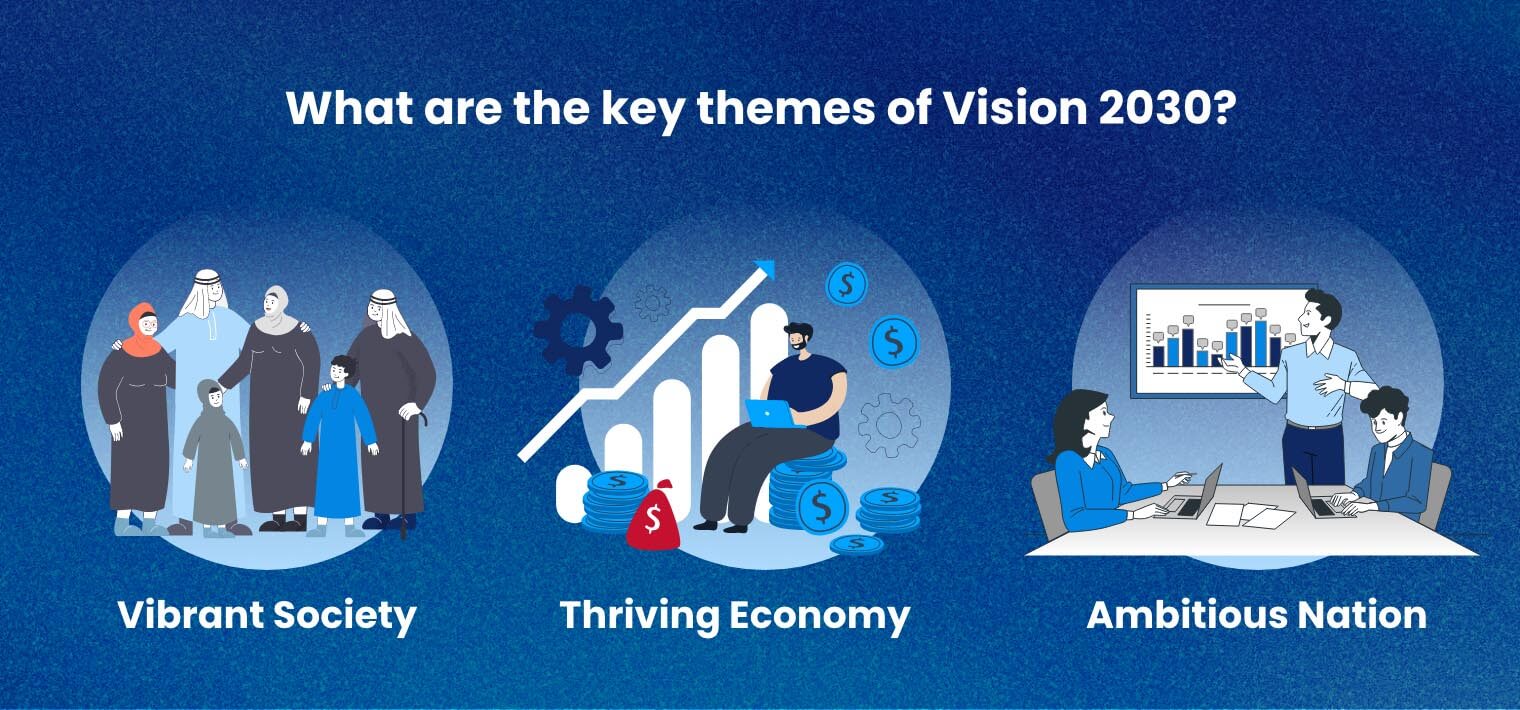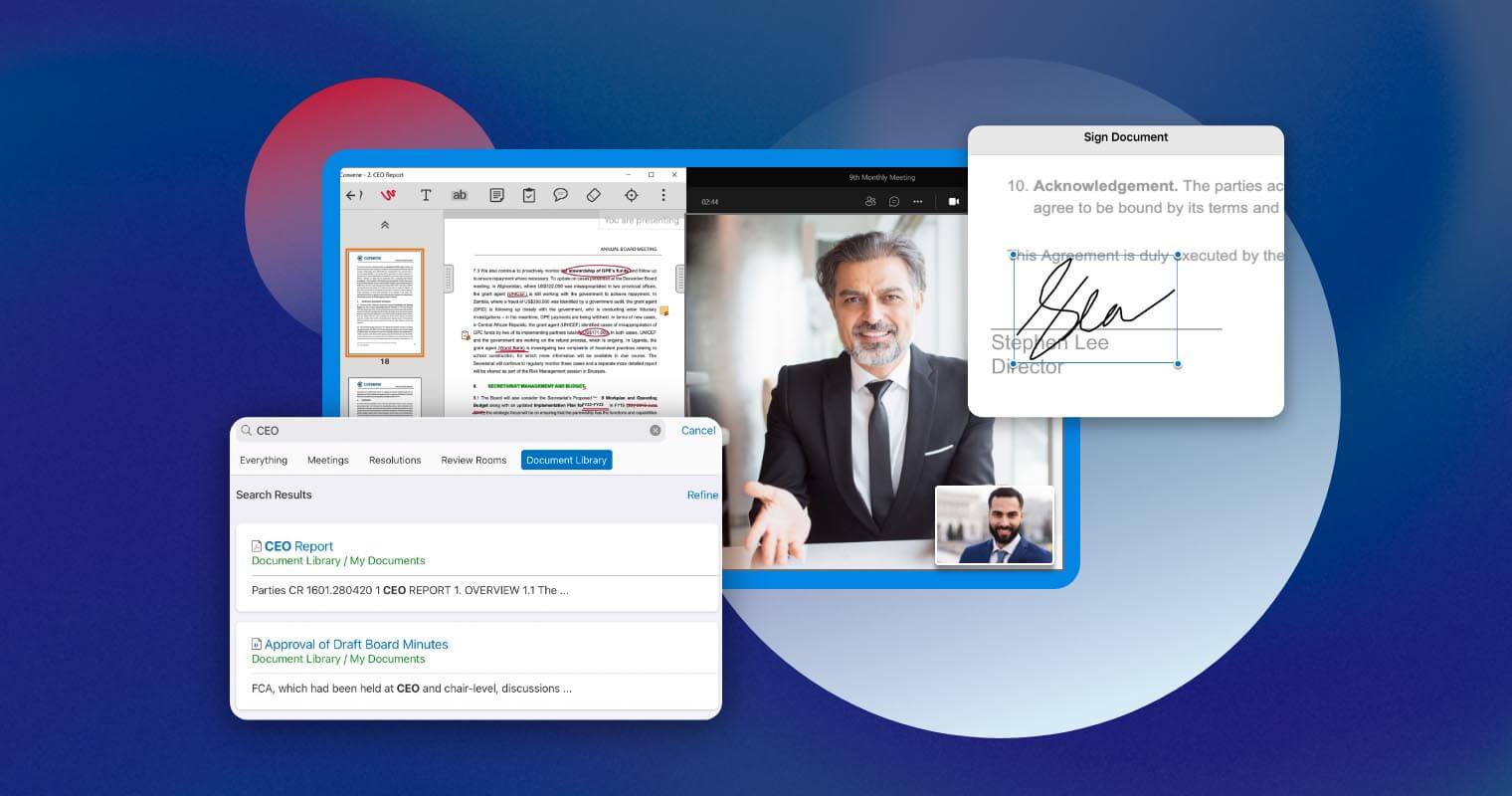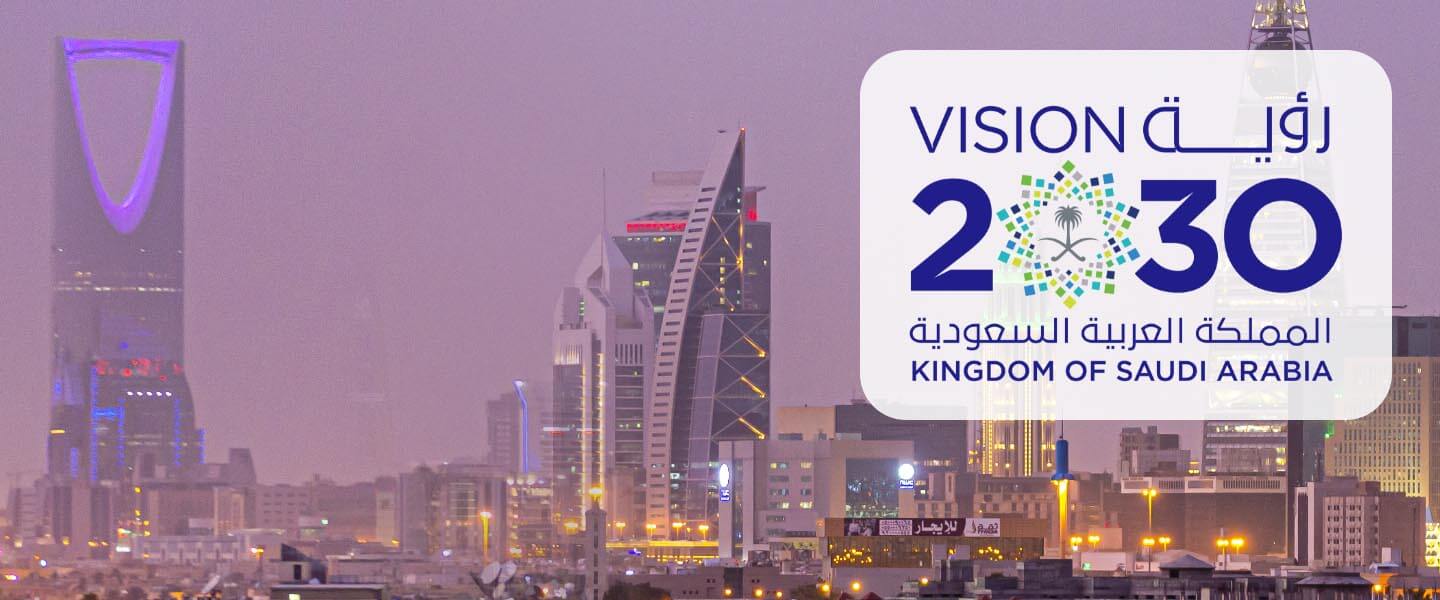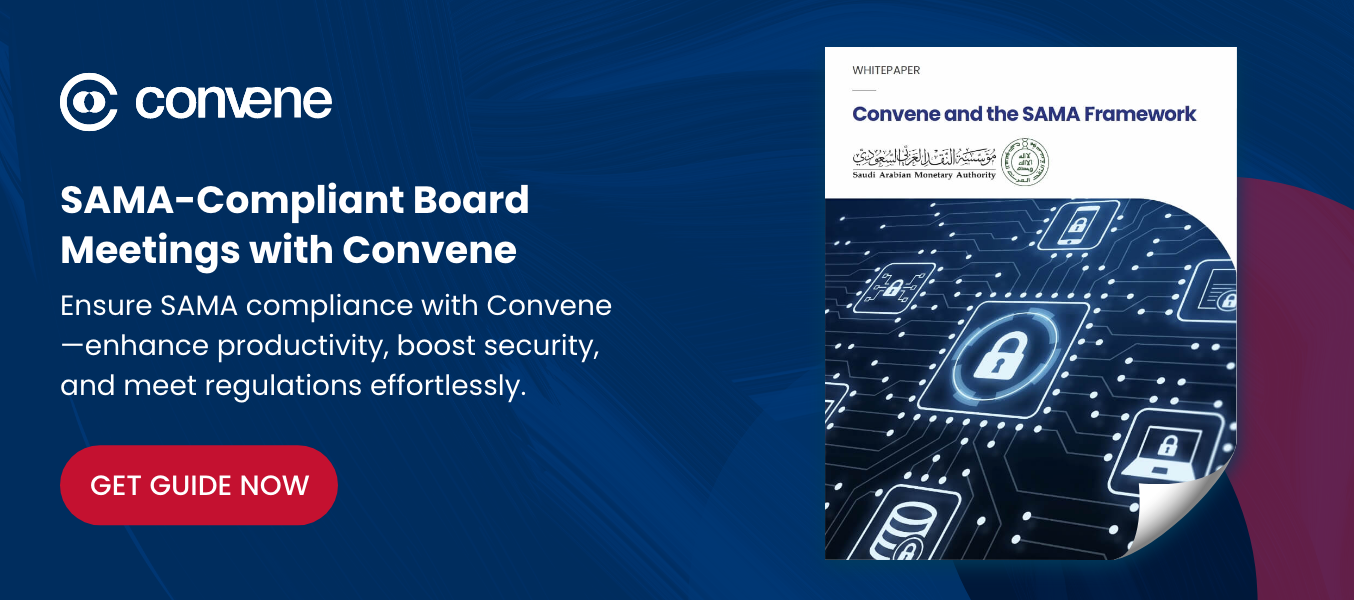From June 2014 to January 2015, global oil prices dropped by 60 per cent, marking the steepest decline since 2009. This was driven by a surge in shale oil production in the United States, which disrupted the global market and led to oversupply. As a result, oil-driven economies, including Saudi Arabia, faced significant challenges in managing their revenues.
As a nation that generates over 75% of its budget from oil revenue, the crisis accelerated the need to diversify its economy and find other revenue streams to reduce dependence on oil. This led Saudi Arabia to start Vision 2030 – an ambitious roadmap to transforming the nation’s economy, society, and governance to secure economic sustainability in a post-oil future.
Explore in this guide the programs under Vision 2030, particularly the digital transformation it drives, to understand how it redefines Saudi Arabia redefine its socio-economic landscape.
What is Vision 2030?
“Launched in April 2016, under the leadership of Crown Prince Mohammed bin Salman, the Saudi Vision 2030 kicked off with economic diversification as its primary goal. At its midway point, the country is making promising developments in non-oil sectors, such as renewable energy, mining, manufacturing, logistics, transportation, tourism, retail, and entertainment. “ – Mr. Alok Kumar, President (Middle East, Africa, and South Asia) of Convene.
Projected to be completed within fourteen years, the government divided Vision 2030 into three phases. From 2016 to 2020, large-scale developments such as economic zones and smart cities were introduced to boost the appeal of Saudi Arabia to investors and improve its business climate. Currently underway, from 2021 to 2024, efforts are directed toward digitalising government and business sectors, guided by the Digital Government Strategy to oversee the adoption of artificial intelligence and cloud computing. Lastly, the final phase from 2025 to 2030 will sustain and expand ongoing transformations with more investment and partnerships to cement Saudi Arabia as a global leader in digitalisation and diversification.
What are the key themes of Vision 2030?

Building a vibrant society, a thriving economy, and an ambitious nation are the three pillars guiding Vision 2030. Here’s how each pillar targets to contribute to national development.
1. A Vibrant Society
Saudi Arabia aspires to be a vibrant society that fosters a fulfilling life for its residents, preserves its cultural heritage, and intensifies its Arabic and Islamic culture. It focuses on programs that enhance education, healthcare, and social programs.
Among the targets of this pillar by 2030 are to:
- Increase average life expectancy to 80 years old and household annual spending on local cultural and entertainment activities to 6%.
- Improve Saudi Arabia’s Social Capital Index to 10th place.
- Rank three Saudi Arabian cities among the 100 global cities.
- Double the quantity of Saudi properties included in the UNESCO World Heritage.
2. A Thriving Economy
This pillar seeks to reconstruct the economic landscape of Saudi Arabia to produce more quality opportunities for businesses and residents. Crucial projects to achieve this are implementing a digital strategy, fortifying support to SMEs, establishing more economic zones, and deregulating the energy market.
By 2030, this pillar targets to achieve the following:
- Increase the contribution of non-oil sectors to GDP.
- Raise Saudi Arabia’s Logistics Performance Index ranking to 25th and Global Competitiveness Index ranking to the top 10.
- Increase the assets of the Public Investment Fund to 1.86 trillion USD.
- Improve the country’s economic position from the 19th largest to the top 15.
- Increase women’s participation in the workforce to 30% and decrease the unemployment rate to 7%.
3. An Ambitious Nation
Saudi Arabia envisions an orderly society that champions transparency and accountability in governance. It encourages all sectors including government, private companies, nonprofits, and residents, to contribute meaningfully to national progress by being ethical and compliant in their undertakings.
The targets of this pillar are:
- Increase the GDP contribution of the nonprofit sector to 5%.
- Improve the country’s E-Government Survey Index to the top 5 and the Saudi Arabia Government Index ranking to 20th.
- Raise non-oil government revenue to 265 billion USD.
How is Vision 2030 Transforming Saudi Arabia
Saudi Vision 2030 is a multifaceted blueprint consisting of sub-programs for specific areas of development. To mark the advantages of the 2030 Vision, here’s how the programs impact Saudi Arabia collectively:
1. Innovating Financial Systems
Vision 2030 builds an advanced capital market by integrating the latest FinTech strategies, facilitating better financial planning and flexible income options. Streamlining policies for private companies helps acquire partnerships that boost funding of health, education, and transportation initiatives.
The vision also has access to Public Investment Funds, allowing the government to pursue the development of gigaeconomic projects, such as NEOM, Qiddiya, Red Sea Global, Roshin, and Diriyah Company.
2. Elevating Living Conditions
Vision 2030 elevates the quality of life in Saudi Arabia as revenue from non-oil sectors rises by offering more accessible e-government services. For example, under the Housing Program, the Sakani project operates to provide affordable housing options for residents by loosening financial policies to reach a 70% homeownership rate by 2030.
In education, the government launched the Human Capability Program to equip residents for success with lifelong learning opportunities. This makes schooling and university more accessible to everyone, including children, teens, and adults, enhancing their educational experience.
3. Building a Diverse Economy
The vision is unlocking non-oil sectors to increase employment, tourism volume, and business opportunities. In tourism, the Pilgrim Experience Program is upgrading the services provided to Hajj and Umah visitors by digitalising applications for e-visas and tour tickets. This allows them to experience seamless and hassle-free pilgrimage, raising the interest of others to tour in Saudi Arabia.
Targeting to become a global player in energy, mining, manufacturing, and logistics, the National Industrial Development and Logistics Program is pioneering policies and projects to push developments in these high-growth industries.
4. Modernising Society
Besides economic diversification, digital transformation is another goal Vision 2030 aims for – to create an interconnected society where modern technologies are accessible to help businesses and residents flourish. The very first program under Saudi Vision 2030 to push this is the National Transformation Program. It focuses on cultivating a tech-savvy population and an efficient digital ecosystem to provide superior support to private and public sector growth.
Key Digital Transformations under Vision 2030
“Under Saudi Vision 2023, Saudi is also establishing its regional leadership in the digital economy. Launched in 2020, The Digital Cooperation Organization (DCO), is the world’s first standalone international organization focusing on the digital economy.” – Alok Kumar.
To realise the vision of a technologically advanced society, here are digital strategies Saudi Arabia is adapting to revamp social and governance systems successfully:
1. Internet of Things and Smart Cities
Higher internet connectivity boosts Saudi Arabia’s preparedness to employ the Internet of Things (IoT) in its smart cities. The IoT market of the country will rise to 2.9 billion USD by 2025, promising more advanced network capabilities for seamless interaction among businesses and residents. The impacts of this development will be critical to projects such as Waad Ashamal and SPARK.
2. Artificial Intelligence
Saudi Arabia ranked first among Arab countries in Tortoise Media’s Government Strategy Index for Artificial Intelligence for 2024. Aligned with the objectives of Vision 2030, the spending for AI is estimated to reach 1.9 billion by 2027 and contribute 135 billion USD to its GDP in 2030. In logistics and transportation, companies prospect AI for hauling optimisation, equipment lifetime analytics, supplier delivery date prediction, and asset tracking.
3. Cloud Computing
Saudi Arabia opened the first special zone for cloud computing in the region in 2023 to attract more local and foreign businesses to serve the local market. With cloud service providers localising data centres, it’s become easier for companies to scale cloud storage while maintaining compliance with privacy and data standards. Additionally, cloud computing in healthcare is seeing a surge in demand to advance health technology and optimise patient care according to Vision 2030.
Understanding Digital Government Strategy Framework

As the nation continues to embrace more technological advancements, there’s also an increasing need for a digital governance framework to regulate and oversee its implementation across sectors and segments of society. Central to this is the Digital Government Strategy under the Digital Government Authority.
Aligning with the overarching goals of Saudi Vision 2030 and UN Sustainable Development Goals (SDGs), this strategy targets to rank Saudi Arabia among the top 10 countries for digital governance by achieving the following:
- Satisfied Residents: Provide comprehensive digital governance services useful for residents at every stage of their lives. Examples are portals for educational opportunities, job hunting, health clinics, homeownership, retirement planning, and estate management.
- Enabled Business: Create a digital-first ecosystem in businesses to streamline processes, fostering a more efficient and accessible environment for entrepreneurship and growth.
- Effective Governance: Use data analytics and digital platforms for optimising financial planning and speeding up decision-making to enhance the overall efficiency of government operations.
- Efficient Investment: Develop a modern investment system to increase private sector participation, boost FDI and DDI inflows, and improve GDP.
- Regulated Digital Ecosystem: Implement digital IDs to make e-government services more accessible while maintaining high-level data governance.
- Expedited Transformation: Oversee implementation of cloud computing, open source, and enterprise architecture across government agencies to manage cybersecurity effectively.
The Importance of Digitalisation in Saudi Arabia
Digitalisation offers a range of benefits to residents, businesses, and the government:
- Streamlined services for residents: The government is simplifying access to essential public sector services like never before. According to the National Transformation Program 2022 report, Saudi Arabia has digitised over 97% of government services. This initiative mainly impacted services in education, justice, health, and other public sectors.
- Data-driven decision-making: Data analytics supports government agencies by speeding up data collection and analysis. It upgrades their capabilities to make more sound policies and projects based on factual data.
- Data governance: There’s a higher priority for data governance to protect the sensitive information of the population as digital tools become more integrated in Saudi Arabia. Despite making services and information more accessible to people, the government ensures there are stringent policies and measures to safeguard them.
- Enhanced workforce: Digitalisation led Saudi Arabia to focus on digital literacy by providing the workforce with specialised programs to match the competition of the modern labour market. This upskills public and private-sector employees necessary for effective governance.
- Improved coordination: Centralising governance resources, digitalisation fosters greater coordination across government agencies. Departments are empowered to connect with other offices faster using digital communication tools and cloud-based platforms. This helps create a more responsive and adaptive governance structure.
Convene: The Future-Ready Solution Driving Digital Transformation for Businesses in the GCC

Vision 2030 urges Saudi Arabian companies to develop digital strategies to fully unlock their potential as the country accelerates its digital transformation.
One of the first areas for digitalisation is board management.
As the driving force behind strategic direction, the board of directors can enhance its efficiency and effectiveness by leveraging digital systems. From organising council meetings and reviewing documents to tracking progress, doing these manually can quickly become overwhelming, leading to slowdowns that impact the company’s overall productivity.
Convene board portal software is a leading solution for Middle Eastern and global companies to streamline board operations and simplify meeting management. An award-winning solution in this space, Convene is packed with the following powerful features to empower the board of directors in its role.
- Enterprise Cloud Hosting: Ensure high-level data security with Convene’s flexible and scalable data hosting via STC Cloud Hosting. Confidently exchange sensitive board information within the app without worrying about data breaches or leaks.Ease-of-Use: Access the Convene user account using your preferred device, whether mobile, laptop, or web. This reduces the learning curve for non-tech savvy board directors.
- Integrated Digital Signature: Facilitate seamless signing with Convene’s signature solutions. Partnered with trusted third-party providers such as DocuSign, E-Güven, Infile, and Sayen by stc, board directors in Saudi Arabia can ensure that the process follows regional legal requirements, making document signing legally valid.
- Centralised Document Repository: Store board materials in one secure digital space to improve accessibility and reduce the risk of document loss. With Convene, board directors won’t waste time searching for specific files, as they can easily search for them directly within the app.
- Streamlined Meeting Management: Accomplish meeting packs faster with Convene’s smart management tools. Board administrators can use the meeting scheduler to find the best meeting time and the agenda builder to compile discussion points and files by dragging and dropping items. During meetings, the task management and minute taker enables users to record key decisions and action items in real-time, streamlining follow-ups and progress monitoring.
- Enhanced Collaboration: Convey ideas and perspectives more efficiently using live meeting tools such as annotations, voting, and page synchronisation.
The future of board governance is here. More than 100 organizations in the KSA have trusted Convene for paperless and secure board & committee meetings. Schedule a walkthrough with our local sales team to discover how Convene’s all-in-one platform can help your business streamline digital governance and drive impactful decision-making.
Jean is a Content Marketing Specialist at Convene, with over four years of experience driving brand authority and influence growth through effective B2B content strategies. Eager to deliver impactful results, Jean is a data-driven marketer who combines creativity with analytics. In her downtime, Jean relaxes by watching documentaries and mystery thrillers.











